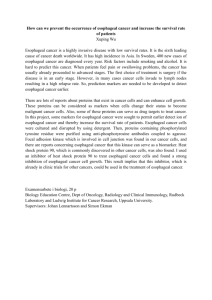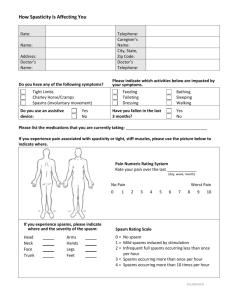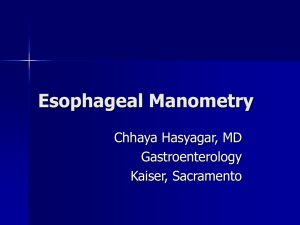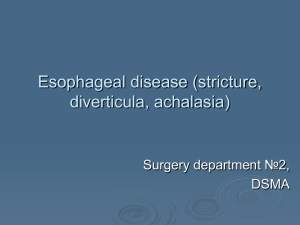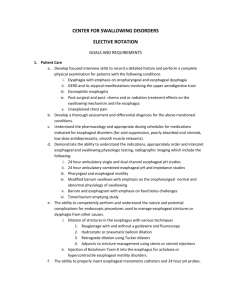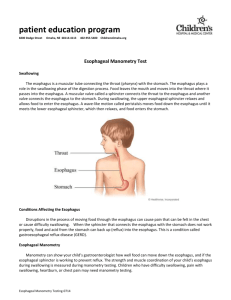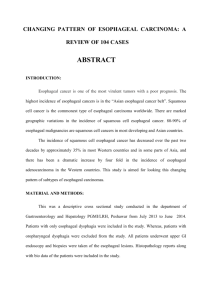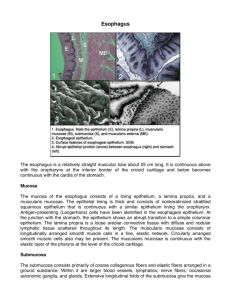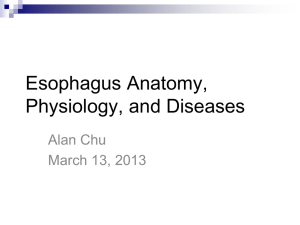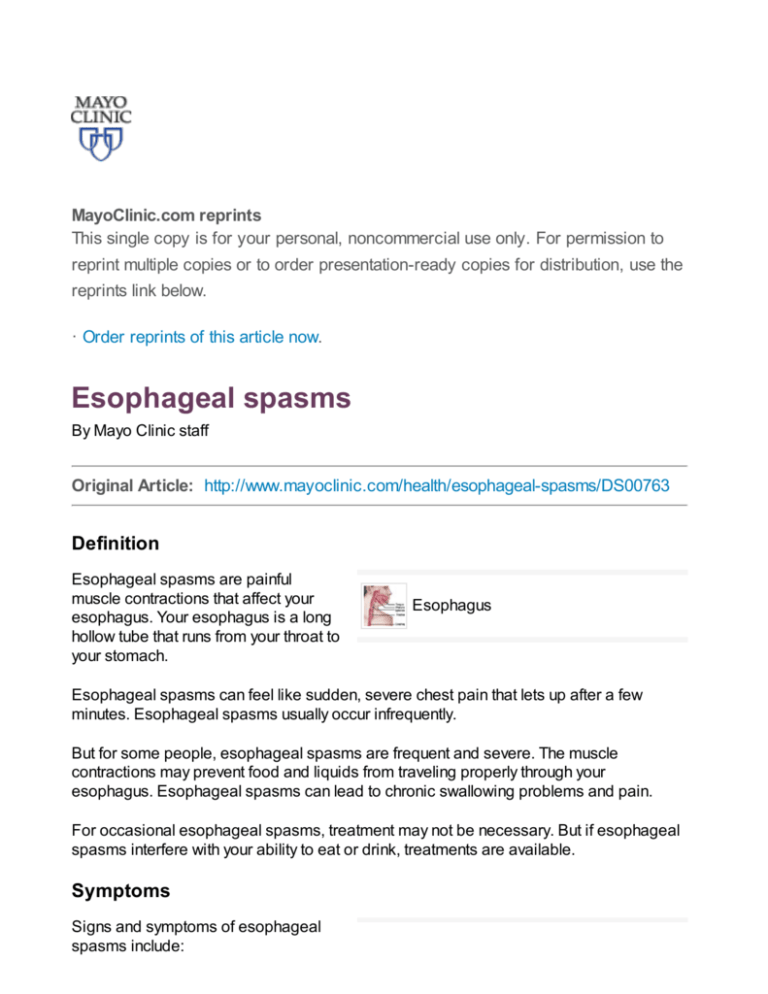
MayoClinic.com reprints
This single copy is for your personal, noncommercial use only. For permission to
reprint multiple copies or to order presentation-ready copies for distribution, use the
reprints link below.
· Order reprints of this article now.
Esophageal spasms
By Mayo Clinic staff
Original Article: http://www.mayoclinic.com/health/esophageal-spasms/DS00763
Definition
Esophageal spasms are painful
muscle contractions that affect your
esophagus. Your esophagus is a long
hollow tube that runs from your throat to
your stomach.
Esophagus
Esophageal spasms can feel like sudden, severe chest pain that lets up after a few
minutes. Esophageal spasms usually occur infrequently.
But for some people, esophageal spasms are frequent and severe. The muscle
contractions may prevent food and liquids from traveling properly through your
esophagus. Esophageal spasms can lead to chronic swallowing problems and pain.
For occasional esophageal spasms, treatment may not be necessary. But if esophageal
spasms interfere with your ability to eat or drink, treatments are available.
Symptoms
Signs and symptoms of esophageal
spasms include:
Squeezing pain in your chest,
Esophagus
often intense, which you might
mistake for heart pain (angina)
Difficulty swallowing (dysphagia)
The feeling that an object is stuck in your throat (globus)
The return of food and liquids back up your esophagus (regurgitation)
When to see a doctor
See your doctor if you have signs and symptoms that worry you. Esophageal spasms can
cause squeezing chest pain — a symptom that can also be caused by a heart attack. If
you experience squeezing chest pain and aren't sure what's causing your symptoms,
seek medical attention right away.
Causes
It's not clear what causes esophageal spasms.
A healthy esophagus moves food into your stomach through a series of coordinated
muscular contractions, called peristalsis. Esophageal spasms disrupt this process by
making it difficult for the muscles in the walls of your lower esophagus to coordinate in
order to move food to your stomach.
Types of esophageal spasms
Esophageal spasms may occur in two forms:
Diffuse esophageal spasms. People with diffuse esophageal spasms
experience intermittent contractions in the esophageal muscles that are often
accompanied by regurgitation of food or liquids.
Nutcracker esophagus. People with nutcracker esophagus experience painfully
strong contractions in the esophageal muscles. Of the two types of esophageal
spasms, nutcracker esophagus is less likely to cause regurgitation of food and
liquids.
Risk factors
Factors that increase your risk of esophageal spasms include:
Being a woman
Eating or drinking hot or cold foods or liquids
Heartburn
Gastroesophageal reflux disease (GERD)
Anxiety
Preparing for your appointment
Start by seeing your family doctor or a general practitioner if you have signs and
symptoms that worry you. You may be referred to a doctor who specializes in digestive
diseases and conditions (gastroenterologist) for further testing and diagnosis.
Because appointments can be brief, and because there's often a lot of ground to cover,
it's a good idea to be well prepared for your appointment. Here's some information to
help you get ready, and what to expect from your doctor.
What you can do
Be aware of any pre-appointment restrictions. At the time you make the
appointment, either with your primary care doctor or the gastroenterologist, be sure
to ask if there's anything you need to do in advance, such as restrict your diet.
Write down any symptoms you're experiencing, including any that may seem
unrelated to the reason for which you scheduled the appointment.
Write down key personal information, including any major stresses or recent life
changes.
Make a list of any medications, as well as any vitamins or supplements, you're
taking, along with the dosage of each medication.
Write down questions to ask your doctor.
Preparing a list of questions ahead of time will help you make the most of the limited time
you may have with your doctor. List your questions from most important to least important
in case time runs out. For esophageal spasm, some basic questions to ask your doctor
include:
What is likely causing my symptoms?
Are there any other possible causes for my symptoms?
Is there a way for me to safely tell if my chest pain is being caused by an
esophageal spasm, rather than another condition, such as a heart problem?
What kinds of tests do I need? How do I need to prepare for these tests?
Is my condition likely temporary or chronic?
What treatments are available?
What are the alternatives to the primary approach that you're suggesting?
Is there anything I can do on my own, such as make changes in my diet, that will
improve my symptoms?
What types of foods are likely to make my symptoms worse?
I have these other health conditions. How can I best manage them together?
Should I see a specialist? What will that cost, and will my insurance cover it?
Is there a generic alternative to the medicine you're prescribing me?
Are there any brochures or other printed material that I can take with me? What
websites do you recommend?
In addition to the questions that you've prepared to ask your doctor, don't hesitate to ask
questions during your appointment.
What to expect from your doctor
Your doctor is likely to ask you a number of questions. Being ready to answer them may
reserve time to go over points you want to spend more time on. Your doctor may ask:
When did you first begin experiencing symptoms?
Have your symptoms been continuous or occasional?
How severe are your symptoms?
What, if anything, seems to improve your symptoms?
What, if anything, appears to worsen your symptoms?
Are your symptoms related to eating?
Does any particular food or type of food trigger your symptoms?
Do you experience any symptoms of heartburn after eating, such as a burning
sensation in your chest or an acid taste in your mouth?
Do you ever wake up during the night with heartburn, chest pain or an acid taste in
your mouth?
Do you have difficulty swallowing food or have you had to change your diet to avoid
difficulty swallowing?
What you can do in the meantime
If you know that certain types of foods tend to trigger your symptoms, avoid these foods
while you're waiting to see your doctor. Foods that are either very hot or very cold may
also trigger an esophageal spasm.
Tests and diagnosis
Your doctor may confirm a diagnosis of
esophageal spasm by these methods:
Endoscopy
X-rays of your esophagus.
During a test called a barium
swallow or an esophagram, you're given a thick liquid containing barium that
temporarily coats the lining of your esophagus so it can be seen on X-ray images.
A test to assess your swallowing muscles. During an esophageal manometry
test, your doctor inserts a thin tube through your nose or mouth into your esophagus
to measure the effectiveness of your esophageal muscles in the swallowing
process.
Visual exam with a scope that lets your doctor see inside your esophagus.
During an upper endoscopy, a thin, hollow tube equipped with a camera is passed
through your mouth and down your throat to look directly at your esophagus.
Treatments and drugs
Treatment may not be necessary for occasional esophageal spasms
If you experience esophageal spasms only occasionally, you may not require treatment.
Though the chest pain that accompanies esophageal spasms can be alarming, it tends to
go away in a few minutes. Pay attention to what triggers your esophageal spasms and try
to avoid these situations.
Treatments for esophageal spasms that interfere with eating and drinking
If your esophageal spasms make it difficult to eat or drink, your doctor may recommend
treatments. Options may include:
Managing any underlying conditions. Conditions such as heartburn or
gastroesophageal reflux disease may trigger spasms, and treating these conditions
may lessen the likelihood of esophageal spasm symptoms. Treating any underlying
psychological disorders, such as anxiety or depression, also may help relieve
esophageal spasms.
Medications to relax your swallowing muscles. Your doctor may recommend
medication to help relax your muscles and reduce the severity of contractions.
Muscle-relaxing drugs may include nitrate medications, such as isosorbide (Isordil),
nifedipine (Procardia), diltiazem (Cardizem, Tiazac, others) or dicyclomine (Bentyl).
Antidepressants that control pain. Your doctor may also prescribe tricyclic
antidepressants, such as amitriptyline, imipramine (Tofranil) and trazodone, to
reduce pain.
Surgery. In rare cases, surgery may be an option if other treatments haven't helped.
One surgical option is a procedure to make esophageal contractions weaker by
cutting some of the muscles in which the spasms occur (myotomy).
Lifestyle and home remedies
To help you cope with occasional esophageal spasms, try to:
Identify your triggers. Make a mental list of things that cause your esophageal
spasms, such as cold or hot foods and drinks, or red wine. Avoid these triggers.
Choose food that is warmed or cooled, not hot or cold. Let hot foods and
drinks cool before eating or drinking them. Let cold foods and drinks warm a bit.
Find ways to control stress. Esophageal spasms may be more common or more
severe when you're stressed. Find ways to reduce the stress in your daily life,
focusing on the most important tasks in each day. Some stress is inevitable, so find
healthy ways to cope with your stress, such as writing down your feelings in a journal
or exercising.
References
July 31, 2010
DS00763
© 1998-2012 Mayo Foundation for Medical Education and Research (MFMER). All
rights reserved. A single copy of these materials may be reprinted for noncommercial
personal use only. "Mayo," "Mayo Clinic," "MayoClinic.com," "EmbodyHealth,"
"Enhance your life," and the triple-shield Mayo Clinic logo are trademarks of Mayo
Foundation for Medical Education and Research.

